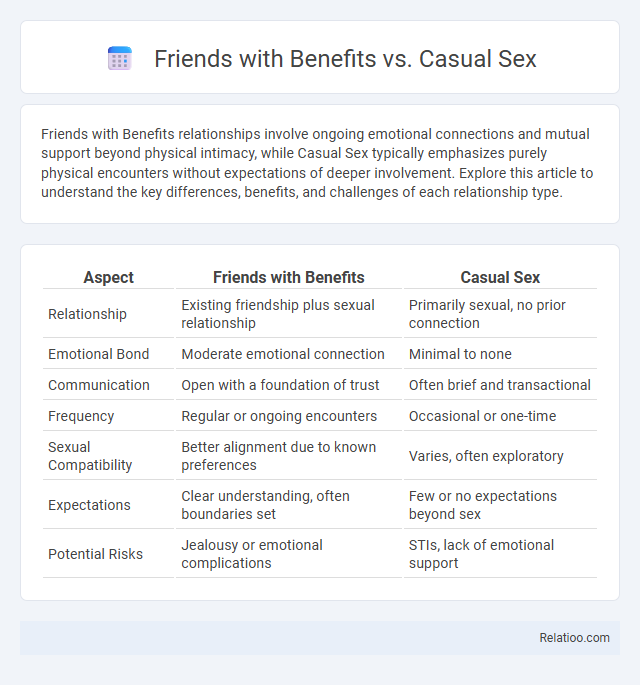Friends with Benefits relationships involve ongoing emotional connections and mutual support beyond physical intimacy, while Casual Sex typically emphasizes purely physical encounters without expectations of deeper involvement. Explore this article to understand the key differences, benefits, and challenges of each relationship type.
Table of Comparison
| Aspect | Friends with Benefits | Casual Sex |
|---|---|---|
| Relationship | Existing friendship plus sexual relationship | Primarily sexual, no prior connection |
| Emotional Bond | Moderate emotional connection | Minimal to none |
| Communication | Open with a foundation of trust | Often brief and transactional |
| Frequency | Regular or ongoing encounters | Occasional or one-time |
| Sexual Compatibility | Better alignment due to known preferences | Varies, often exploratory |
| Expectations | Clear understanding, often boundaries set | Few or no expectations beyond sex |
| Potential Risks | Jealousy or emotional complications | STIs, lack of emotional support |
Defining Friends with Benefits and Casual Sex
Friends with Benefits involves a consensual relationship where friends engage in sexual activity without romantic commitment, prioritizing mutual boundaries and open communication. Casual Sex refers to spontaneous or planned sexual encounters outside of committed relationships, often emphasizing physical pleasure without emotional attachment. Understanding these distinctions helps you navigate your expectations and maintain clarity in your sexual relationships.
Key Differences Between Friends with Benefits and Casual Sex
Friends with Benefits relationships involve ongoing sexual activity combined with an established friendship, emphasizing emotional familiarity alongside physical intimacy. Casual sex typically occurs between strangers or acquaintances without a commitment or continuing relationship, focusing primarily on physical gratification. Sex-positive attitudes recognize and affirm all consensual sexual expressions, including both friends with benefits and casual sex, without stigma or judgment.
Emotional Dynamics in Friends with Benefits vs Casual Sex
Friends with benefits relationships often involve a unique blend of emotional intimacy and physical connection, creating complexities that differ from casual sex encounters typically characterized by minimal emotional involvement. Your emotional dynamics in friends with benefits arrangements may include attachment, trust, and the potential for conflicted feelings, unlike casual sex which focuses primarily on physical pleasure without expectations of emotional closeness. Recognizing these differences helps you navigate boundaries and communication more effectively to maintain a healthy balance in either relationship style.
Communication and Boundaries in Both Relationships
Clear communication and well-defined boundaries are essential in friends with benefits, casual sex, and sex-positive relationships to ensure mutual understanding and respect. Establishing expectations regarding emotional involvement, frequency of contact, and safe sex practices helps prevent misunderstandings and fosters trust. Prioritizing honest dialogue allows you to navigate these relationships confidently and maintain emotional well-being.
Common Motivations for Each Type of Arrangement
Friends with benefits arrangements often revolve around mutual attraction combined with a shared desire for companionship without the obligations of a romantic relationship. Casual sex typically stems from the pursuit of sexual gratification without emotional attachment, emphasizing spontaneity and personal freedom. Sex-positive individuals prioritize acceptance, open communication, and consent, fostering relationships driven by exploration and respect rather than societal stigmas.
Risks and Benefits: Physical and Emotional Health
Friends with Benefits relationships offer emotional support and physical intimacy without commitment, reducing stress and enhancing mood, but carry risks of emotional confusion and potential loss of friendship. Casual sex provides physical pleasure and sexual exploration with fewer emotional attachments, lowering the pressure of relationship expectations, yet increases the risk of sexually transmitted infections and possible feelings of guilt or loneliness. Sex-positive attitudes promote open communication, consent, and safe practices, enhancing emotional well-being and reducing stigma, but require ongoing education and self-awareness to navigate boundaries and maintain physical and mental health.
Navigating Jealousy and Attachment
Navigating jealousy and attachment in Friends with Benefits relationships requires clear communication and established boundaries to maintain emotional detachment while enjoying physical intimacy. Casual sex often involves minimal emotional involvement, reducing jealousy risk but necessitating mutual understanding to prevent misunderstandings and preserve autonomy. In sex-positive dynamics, open dialogue about feelings and consent fosters a healthy environment where jealousy is acknowledged and managed, promoting emotional well-being and respectful connections.
Societal Perceptions and Stigmas
Friends with Benefits, casual sex, and sex-positive attitudes each carry distinct societal perceptions and stigmas shaped by cultural norms and personal values. Friends with Benefits often face judgment for blurring emotional and physical boundaries, while casual sex can be stigmatized due to assumptions about morality or promiscuity. Embracing a sex-positive mindset challenges these stigmas by promoting open, consensual, and non-judgmental attitudes toward diverse sexual experiences, encouraging you to prioritize your own boundaries and well-being.
Transitioning Out of Friends with Benefits or Casual Sex
Transitioning out of friends with benefits or casual sex arrangements requires clear communication to redefine boundaries and expectations while preserving mutual respect. You should prioritize honest discussions about emotions and future intentions to prevent misunderstandings and maintain a healthy dynamic. Embracing a sex-positive mindset facilitates openness and personal growth during this shift, empowering you to make choices that align with your well-being.
Choosing What’s Right for You
Choosing between friends with benefits, casual sex, and a sex-positive lifestyle depends on personal boundaries, emotional needs, and communication preferences. Friends with benefits relationships offer a blend of friendship and intimacy without commitment, while casual sex emphasizes physical connection with minimal emotional engagement. Embracing a sex-positive mindset encourages open exploration of desires and consent, empowering individuals to make informed choices that align with their values and well-being.

Infographic: Friends with Benefits vs Casual Sex
 relatioo.com
relatioo.com